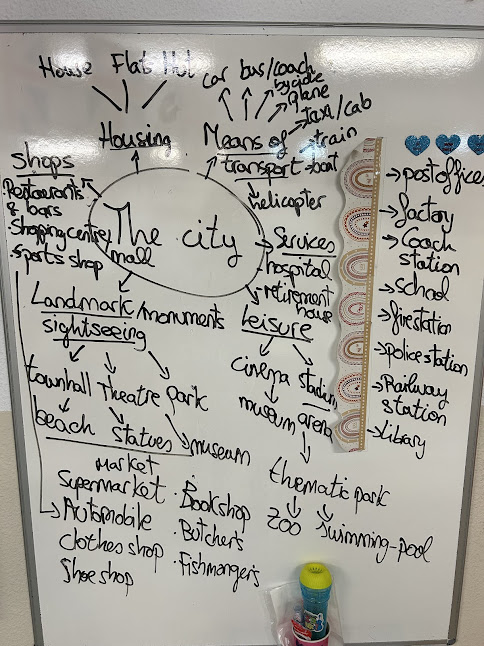Unit 4:
|
Everyday vocabulary and structures Vocabulario: Vocabulary: drop litter, metal, paper, metal, plastic, glass, pick
up litter, recycle, reduce, reuse, rubbish, swap clothes, turn off/on lights,
waste food, cut the grass, dig up the weeds, feed the birds, grow vegetables, make
a wildlife area, plat seeds, pollution. The problem with
plastic: community, clean, dirty, look
after, volunteer, water a plant. Grammar 1:Recommendations
and obligations Recommendations:
Should and shouldn’t May, might Can, could Obligations: Have to, don’t have to Must, musn’t Grammar 2:Asking
about qauantity Have we got enough…?: Yes, we have / No, we haven’t
We need some more / We’ve got lots. Grammar Regular verbs (past and participle are the same form). Irregular verbs INF- Past- Participle __________________________________________________________________ UNIT 3 In the city Everyday vocabulary and structures Vocabulario Establishments around town (Leisure): Art gallery, aquarium, bowling alley, ice rink, restaurant, shopping centre, square, stadium, theatre, library. Means of Transport: car, airplane, train, bus, coach, metro, underground, tube, taxi, cab, tram, motorbike. Culture Directions: cricket, safe, bike paths Fun: skatepark, funfair, rollercoaster, surf, match, trip, beach Others: station, bridge, race, competition Grammar Regular verbs (past and participle are the same form). to score- scored to walk- walked to talk- talked to love- loved to prefer- preferred Irregular verbs INF- Past- Participle to hit hit hit to eat ate eaten to drink drank drunk to sit sat sat to come came come to see saw seen to ride rode ridden Contenidos básicos Everyday Language: Directions: Excuse me, how do I get to...? Turn left/right. Go straight ahead. The ..... is on your left/right/ next to..../ in fornt of.../ behind... _________________________________________________________________ Unit 2 Everyday vocabulary and structures Vocabulario Jobs (regular verbs): finished school, joined a team, learned to swim, lived in a town, moved to Liverpool, passed a test, started school, studied French, travelled to France, worked as a chef. Jobs (irregular verbs): got a job, got married, grew up, had children, was born, went to university. Culture Día de los Muertos: candle, celebrate, family member, feel close to marigolds, skeletons. Grammar Regular verbs (past and participle are the same form). to live- lived to arrive- arrived to study- studied to start- started to pass- passed to move- joined to join- joined to work- worked to travel- travelled to visit- visited to finish- finished Irregular verbs INF- Past- Participle to be- was/were- been to have- had - had to do- did- done to go- went- gone to get- got- got to learn- learned- learnt to swim- swam- swum to grow- grew- grown Contenidos básicos Everyday Language: What does he/she do? He's / She's a ... When does he/she work? He /She often works (in the evening/at the weekends). What does he/ she wear at work? He/She wears (casual/ formal/...) clothes. What's his/ her job like? It's interesting/ boring/ difficult/ exciting. |
|
Unit 1 Everyday vocabulary and structures Vocabulario Jobs: artist, chef, computer programmer, doctor, firefighter, pilot, police officer, scientist, vet. Unusual jobs: broken, canal, collect, fishermen, healthy hurt, million, swan. Adjectives: careful, easy, helpful, patient, quick, slow. Grammar Possessive adjectives I- my You-your He- his She- her It- its We- our They- their Adverbs: carefully, easily, patiently, quickly, slowly. Generally, normally, usually, always, never, often, sometimes. Contenidos básicos Everyday Language: What does he/she do? He's / She's a ... When does he/she work? He /She often works (in the evening/at the weekends). What does he/ she wear at work? He/She wears (casual/ formal/...) clothes. What's his/ her job like? It's interesting/ boring/ difficult/ exciting. |


No comments:
Post a Comment